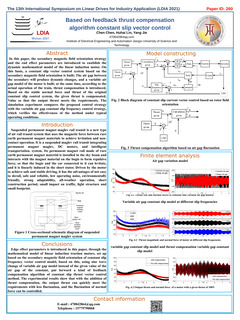Based on feedback thrust compensation algorithm constant slip vector control
ID:260
Submission ID:260 View Protection:PUBLIC
Updated Time:2021-06-18 18:15:51 Hits:840
Poster Presentation
Abstract
In the suspended permanent magnet maglev train,
the permanent magnet array is used as the suspension structure,
and the short stator linear induction motor is used as the traction
structure. The suspension system is a self-stabilizing system. As
the vertical force changes, the suspension gap and the motor air
gap are changing. The change in the air gap of the motor causes
the output thrust to fail to meet the requirements; at the same time,
the normal force of the system will also fluctuate. The normal
force is the vertical disturbance of the bogie, which has a greater
impact on the dynamic posture of the bogie and needs to be
adjusted. control. In this paper, the secondary magnetic field
orientation strategy is adopted, the end effect parameters are
introduced, and the dynamic mathematical model of the linear
induction motor is established. On this basis, a constant slip vector
control system based on the secondary magnetic field orientation
is built; The air gap between the secondary will produce dynamic
changes, and a variable air gap model of the motor is built; at the
same time, according to the actual operation of the train, thrust
compensation is introduced. Based on the stable normal force and
thrust of the original constant slip control system, the given thrust
is compensated. Value so that the output thrust meets the
requirements. The simulation experiment compares the proposed
control strategy with the variable air gap constant slip frequency
control strategy, which verifies the effectiveness of the method
under typical operating conditions.
Keywords
improved constant slip vector control magnet levitation LIM
Submission Author
chen chen
Jiangxi University of Science and Technology School of Electrical Engineering and Automation


Comment submit